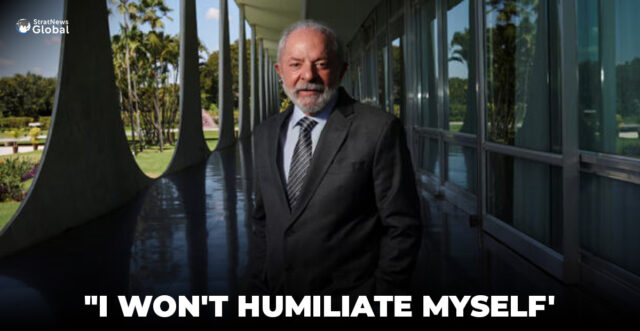With US tariffs on Brazilian goods surging to 50% on Wednesday, Brazilian President Luiz Inacio Lula da Silva told Reuters he currently saw no scope for direct talks with US President Donald Trump, calling such a meeting likely to be a “humiliation”.
Brazil is not about to announce reciprocal tariffs, he said. Nor will his government give up on cabinet-level talks. But Lula himself is in no rush to ring the White House.
‘I Won’t Humiliate Myself’
“The day my intuition says Trump is ready to talk, I won’t hesitate to call him,” Lula said in an interview from his presidential residence in Brasilia. “But today my intuition says he doesn’t want to talk. And I won’t humiliate myself.”
Despite Brazil’s exports facing one of the highest tariffs imposed by Trump, the new US trade barriers look unlikely to derail Latin America’s largest economy, giving Lula more room to stand his ground against Trump than most Western leaders.
‘Traitor To The Homeland’
Lula described US-Brazil relations at a 200-year nadir after Trump tied the new tariff to his demands for an end to the prosecution of right-wing former President Jair Bolsonaro, who is standing trial for plotting to overturn the 2022 election.
The president said Brazil’s Supreme Court, which is hearing the case against Bolsonaro, “does not care what Trump says and it should not,” adding that Bolsonaro should face another trial for provoking Trump’s intervention, calling the right-wing former president a “traitor to the homeland”.
“We had already pardoned the US intervention in the 1964 coup,” said Lula, who got his political start as a union leader protesting against the military government that followed a US-backed ouster of a democratically elected president.
“But this now is not a small intervention. It’s the president of the United States thinking he can dictate rules for a sovereign country like Brazil. It’s unacceptable.”
‘I Demand Respect’
The Brazilian president said he had no personal issues with Trump, adding that they could meet at the United Nations next month or U.N. climate talks in November. But he noted Trump’s track record of dressing down White House guests such as South African President Cyril Ramaphosa and Ukrainian President Volodymyr Zelenskyy.
“What Trump did with Zelenskyy was humiliation. That’s not normal. What Trump did with Ramaphosa was humiliation,” Lula said. “One president can’t be humiliating another. I respect everyone and I demand respect.”
Lula said his ministers were struggling to open talks with US peers, so his government was focused on domestic policies to cushion the economic blow of US tariffs, while maintaining “fiscal responsibility”.
Mobilising BRICS
The president declined to elaborate on pending measures to support Brazilian companies, which are expected to include credit lines and other export assistance.
He also said he was planning to call leaders from the BRICS group of developing nations, starting with India and China, to discuss the possibility of a joint response to US tariffs.
“There is no coordination among the BRICS yet, but there will be,” Lula said, comparing multilateral action to the strength of collective bargaining in his union days. “What is the negotiating power of one little country with the United States? None.”
Separately, he said Brazil was looking at lodging a collective complaint with other countries at the World Trade Organization.
“I was born negotiating,” said Lula, who was raised in poverty and rose through union ranks to serve two terms as president from 2003 to 2010, then re-entered politics in the 2022 election to defeat the incumbent Bolsonaro.
But he said he was in no rush to strike a deal or retaliate against US tariffs: “We need to be very cautious,” he said.
Asked about countermeasures targeting US companies, such as greater taxation of big technology companies, Lula said his government was studying ways to tax US firms on equal standing with Brazilian companies.
Lula also described plans to create a new national policy for Brazil’s strategic mineral resources, treating them as a matter of “national sovereignty” to break with a history of mining exports that added little value in Brazil.
(With inputs from Reuters)





